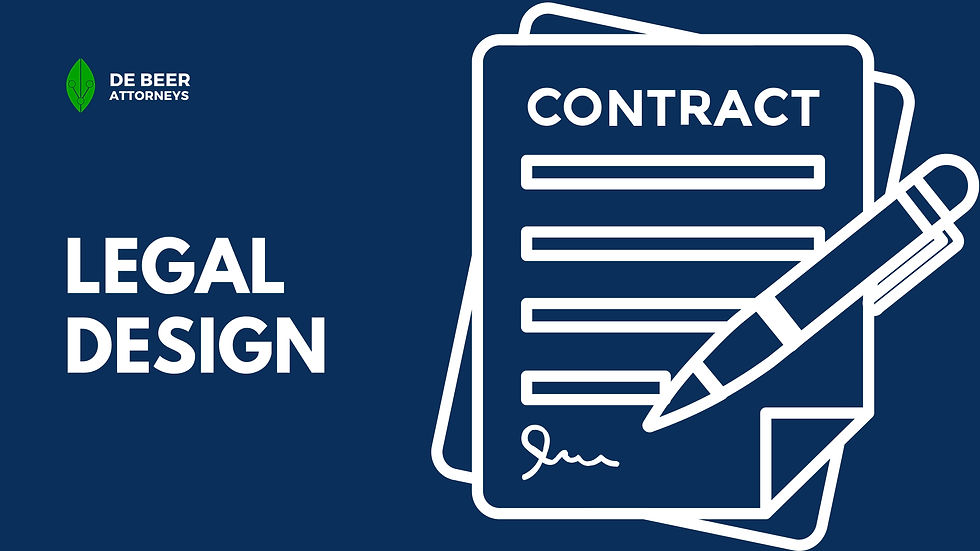
In today’s fast-paced business environment, contracts are the backbone of commercial relationships. However, traditional contracts are often dense, complex, and difficult to understand. This is where legal design comes in—a transformative approach that simplifies contracts, making them more accessible, user-friendly, and effective. In this article, we explore how legal design is shaping contract law in South Africa, examine global trends, and explain why businesses and individuals should prioritise well-designed contracts.
What is Legal Design in Contracts?
Legal design is the process of applying human-centred design principles to legal documents, such as contracts, to make them clearer, more engaging, and easier to understand. This involves using plain language, visual aids, and structured layouts to ensure that all parties can comprehend their rights and obligations without needing a law degree.
In South Africa, where contract law is governed by the Common Law and supplemented by statutes like the Consumer Protection Act (CPA), legal design is becoming increasingly important. The CPA, for instance, emphasises transparency and fairness in consumer agreements, making legal design not just a best practice but a potential legal requirement in specific contexts.
The Importance of Legal Design in South African Contract Law
South African contract law is based on the principle of pacta sunt servanda—agreements must be honoured. However, for an agreement to be enforceable, all parties must fully understand its terms. Poorly drafted contracts can lead to disputes, litigation, and financial losses. Here’s how legal design addresses these challenges:
1. Plain Language: South African courts have increasingly emphasised the importance of clear and unambiguous contract terms. Legal design promotes the use of plain language, ensuring that contracts are accessible to all parties, regardless of their legal expertise.
2. Visual Aids: Incorporating flowcharts, icons, and tables can help break down complex clauses, making it easier for parties to grasp key terms like payment schedules, termination clauses, and dispute resolution mechanisms.
3. User-Friendly Layouts: Structuring contracts with clear headings, bullet points, and summaries enhances readability and reduces the risk of misunderstandings.
4. Compliance with the Consumer Protection Act: For consumer-facing contracts, legal design helps businesses comply with the CPA’s requirements for transparency and fairness, reducing the risk of penalties or reputational damage.
South African Trailblazer in Legal Design: Elizabeth De Stadler
Elizabeth de Stadler, a leading figure in the field of legal design, has been instrumental in transforming how legal documents are created and understood. As the founder of Novation Consulting and Rehabilitated Lawyer and a respected thought leader, she champions the use of plain language, visual aids, and user-centric design to make contracts and legal processes more accessible. Her work emphasises the importance of clarity and transparency, ensuring that legal documents are not only legally sound but also practical and easy to navigate for all parties involved. Elizabeth’s innovative approach has influenced legal practices globally, inspiring businesses and law firms—including De Beer Attorneys—to adopt legal design principles that enhance user experience and reduce legal risks.
Global Trends in Legal Design
While South Africa is embracing legal design, it’s worth noting how other jurisdictions are leading the way:
1. Europe: The European Union has been a pioneer in promoting plain language and transparency in contracts, particularly in consumer agreements. The General Data Protection Regulation (GDPR), for example, requires privacy policies to be clear and concise.
2. United States: Many US companies are adopting smart contracts—digitally encoded agreements that automatically execute when certain conditions are met. These contracts often incorporate legal design principles to ensure clarity and usability.
3. Australia: Australian courts have emphasised the importance of visual communication in contracts.
4. Scandinavia: Known for their innovative approach to law, Scandinavian countries are using legal design to create contracts that are not only functional but also visually appealing, fostering trust and collaboration between parties.
5. Kenya: Local organisations are pioneering initiatives to simplify legal documents and create user-friendly templates for contracts, privacy policies, and consumer agreements. These efforts are particularly impactful in a region where legal literacy is often low, and complex legal language can be a barrier to justice.
These global trends highlight the growing recognition of legal design as a tool for improving contract clarity, reducing disputes, and enhancing user experience.
Why Legal Design Matters for Your Business
For businesses and individuals in South Africa, investing in well-designed contracts offers several benefits:
- Reduced Legal Risks: Clear contracts minimise the risk of disputes and litigation, saving time and money.
- Enhanced Reputation: Transparent and user-friendly agreements demonstrate professionalism and build trust with clients and partners.
- Regulatory Compliance: Legal design helps ensure compliance with South African laws, such as the CPA, reducing the risk of penalties.
- Improved Efficiency: Well-structured contracts streamline negotiations and make it easier to manage contractual obligations.
At De Beer Attorneys, we specialise in commercial law, contract drafting, and legal design. Our team of experienced attorneys understands the intricacies of South African contract law and stays abreast of global trends to provide innovative, client-focused solutions. Whether you’re a business looking to draft user-friendly contracts or an individual seeking clarity in your agreements, we’re here to help.
Don’t let poorly-designed contracts put your business at risk. Contact De Beer Attorneys today to learn how our commercial law and contract drafting services can protect your interests and enhance your agreements. Call us on 021 100 4545 to schedule a consultation. Alternatively, email us at info@debeerattorneys.com. Let’s work together to create contracts that are clear, compliant, and effective.
This information was last updated on 24 February 2025. This information is for general educational and entertainment purposes and is subject to change at any time.

Komentar